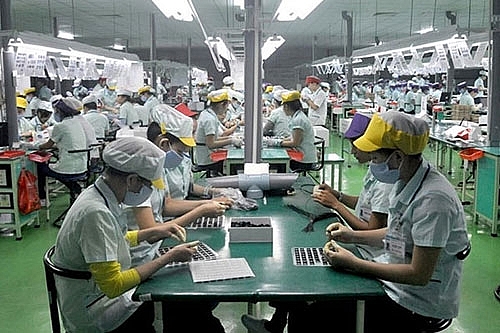One fewer thing to worry for enterprises
 |
| The national minimum wage will most likely not change |
The National Wage Council has just submitted the government Document No.06/BC-HDTLQG recommending to maintain the regional monthly minimum wage in 2021, without issuing new regulations on hourly minimum wage.
Thereby, the regional minimum wage in 2021 will stay at VND4.42 million ($192.17) a month for Region 1, VND3.92 million ($170.44) for Region 2, VND3.43 million ($149.13) for Region 3, and VND3.07 million ($133.48) for Region 4.
This solution aims to help maintain employment while helping businesses overcome their current difficulties, and facilitate post-pandemic recovery while attracting more foreign investment. “This way employees, enterprises, and the state can share the difficulties, facilitating employees to keep their jobs or more easily find new jobs,” a representative of the National Wage Council said.
Around 84.8 per cent of enterprises surveyed by the council reported a lot of difficulties due to COVID-19. 67 per cent of them have implemented solutions to adapt to the pandemic, including letting employees go, rescheduling shifts, rotating workers to stay home, giving unpaid leave, or reducing salaries.
“Not only local businesses, even foreign-invested enterprises are challenged, and the interruption of trade activities has caused great damage to businesses. Scaling down operations, including firing some employees and cutting costs, is the obvious solution to survive. The proposal to not increase the regional minimum wage is good news, and will contribute to lessening our burdens and help us survive,” said Hoang Minh Duc, head of a plastic production company based in Hanoi’s Me Linh district’s Quang Minh Industrial Zone.
Duc’s company has nearly 400 workers and provides some plastic components to the largest South Korean-invested electronics group, Samsung Vietnam. “Although we had to make about 150 employees redundant since the first outbreak, there are still a lot of challenges. We pay almost VND2 billion ($87,000) every month in wages at present and any increase would be untenable in the current context,” he added.
In a survey conducted several months ago by the European Chamber of Commerce (EuroCham), 90 per cent of European enterprises in Vietnam confirmed that they were negatively affected by the pandemic. However, they highly appreciated the solutions of the Vietnamese government, which included extending payment deadlines on numerous tax lines and will likely be overjoyed by not increasing regional minimum wage in 2021.
In the first eight months of the year, nearly 34,300 enterprises had to temporarily suspend operations, up 70.8 per cent on-year; 24,200 enterprises shut down and applied for dissolution procedures, down 5.9 per cent; and 10,400 enterprises completed dissolution procedures, down 1.9 per cent, according to the General Statistics Office of Vietnam.
In early-August, the National Wage Council convened the Vietnam Chamber of Commerce and Industry (VCCI) to represent employers and the Vietnam General Confederation of Labour (VGCL) to represent employees, and the Ministry of Labour, Invalids and Social Affairs (MoLISA) to represent the government to discuss the regional minimum wage in 2021.
Nine members of the council voted to keep the regional minimum wage unchanged to the end of 2021, while the four remaining members (from the VGCL) voted against the proposal.
The regional minimum wage is the lowest financial amount enterprises can pay labourers. The wages of employees working in normal conditions, full time, and accomplishing all tasks assigned cannot be less than the regional minimum wage. In addition, VGCL also recommended businesses not to remove or cut additional wage categories, including payments for overtime, working at night, working in heavy and hazardous conditions, and other allowances.
In a discussion with VIR regarding wages, Vu Quang Tho, director of the VGCL’s Institute for Workers and Trade Unions agreed with the policy, emphasising: “We don’t need to raise the regional minimum wage if it can cover workers’ living needs and keep up with increases in the consumer price index (CPI) and inflation. Additionally, if the economy recovers, production will increase significantly, and GDP will surge – at that time enterprises should acknowledge and appropriately reward the efforts and contributions of their employees.”
| 2017 | 2018 | 2019 | 2020 | 2021 | |
| Area 1 (big cities) | VND3.75 million ($163) | VND3.98 million ($173) | VND4.18 million ($181.74) | VND4.42 million ($192.17) | VND4.42 million ($192.17) |
| Area 2 (cities’ suburban areas) | VND3.32 million ($144.35) | VND3.53 million ($153.48) | VND3.71 million ($161.30) | VND3.92 million ($170.43) | VND3.92 million ($170.43) |
| Area 3 (provinces’ suburban areas) | VND2.9 million ($126) | VND3.09 million ($134.35) | VND3.25 million ($141.30) | VND3.43 million ($149.13) | VND3.43 million ($149.13) |
| Area 4 (rural and remote areas) | VND2.58 million ($112.17) | VND2.76 million ($120) | VND2.92 million ($127) | VND3.07 million ($133.48) | VND3.07 million ($133.48) |
What the stars mean:
★ Poor ★ ★ Promising ★★★ Good ★★★★ Very good ★★★★★ Exceptional
 Tag:
Tag:
Related Contents
Latest News
More News
- VNPAY and NAPAS deepen cooperation on digital payments (February 11, 2026 | 18:21)
- Vietnam financial markets on the rise amid tailwinds (February 11, 2026 | 11:41)
- New tax incentives to benefit startups and SMEs (February 09, 2026 | 17:27)
- VIFC launches aviation finance hub to tap regional market growth (February 06, 2026 | 13:27)
- Vietnam records solid FDI performance in January (February 05, 2026 | 17:11)
- Manufacturing growth remains solid in early 2026 (February 02, 2026 | 15:28)
- EU and Vietnam elevate relations to a comprehensive strategic partnership (January 29, 2026 | 15:22)
- Vietnam to lead trade growth in ASEAN (January 29, 2026 | 15:08)
- Japanese business outlook in Vietnam turns more optimistic (January 28, 2026 | 09:54)
- Foreign leaders extend congratulations to Party General Secretary To Lam (January 25, 2026 | 10:01)



























 Mobile Version
Mobile Version